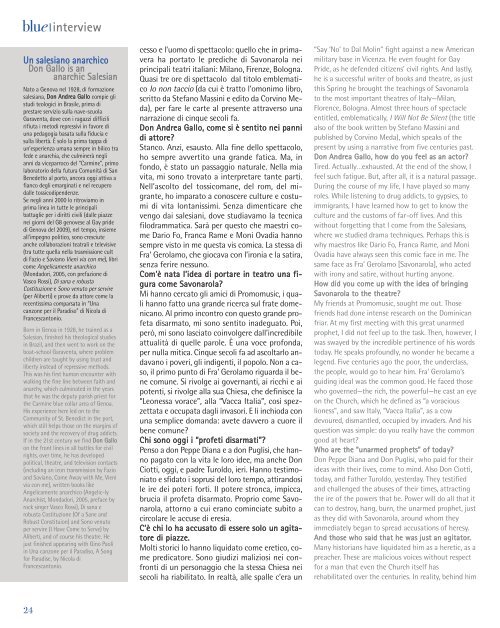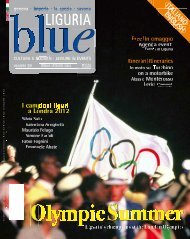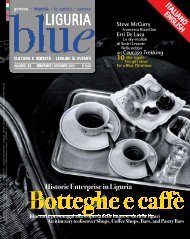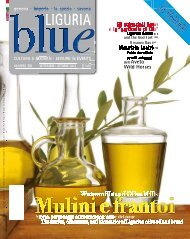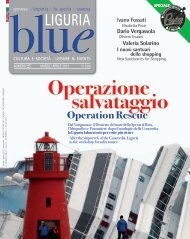Facciamoci sorprendere - Blue Liguria - Sagep
Facciamoci sorprendere - Blue Liguria - Sagep
Facciamoci sorprendere - Blue Liguria - Sagep
Create successful ePaper yourself
Turn your PDF publications into a flip-book with our unique Google optimized e-Paper software.
lue<br />
24<br />
interview<br />
Un salesiano anarchico<br />
Don Gallo is an<br />
anarchic Salesian<br />
Nato a Genova nel 1928, di formazione<br />
salesiana, Don Andrea Gallo compie gli<br />
studi teologici in Brasile, prima di<br />
prestare servizio sulla nave-scuola<br />
Garaventa, dove con i ragazzi difficili<br />
rifiuta i metodi repressivi in favore di<br />
una pedagogia basata sulla fiducia e<br />
sulla libertà. È solo la prima tappa di<br />
un’esperienza umana sempre in bilico tra<br />
fede e anarchia, che culminerà negli<br />
anni da viceparroco del “Carmine”, primo<br />
laboratorio della futura Comunità di San<br />
Benedetto al porto, ancora oggi attiva a<br />
fianco degli emarginati e nel recupero<br />
dalle tossicodipendenze.<br />
Se negli anni 2000 lo ritroviamo in<br />
prima linea in tutte le principali<br />
battaglie per i diritti civili (dalle piazze<br />
nei giorni del G8 genovese al Gay pride<br />
di Genova del 2009), nel tempo, insieme<br />
all'impegno politico, sono cresciute<br />
anche collaborazioni teatrali e televisive<br />
(tra tutte quella nella trasmissione cult<br />
di Fazio e Saviano Vieni via con me), libri<br />
come Angelicamente anarchico<br />
(Mondadori, 2005, con prefazione di<br />
Vasco Rossi), Di sana e robusta<br />
Costituzione e Sono venuto per servire<br />
(per Aliberti) e prove da attore come la<br />
recentissima comparsata in “Una<br />
canzone per il Paradiso" di Nicola di<br />
Francescantonio.<br />
Born in Genoa in 1928, he trained as a<br />
Salesian, finished his theological studies<br />
in Brazil, and then went to work on the<br />
boat-school Garaventa, where problem<br />
children are taught by using trust and<br />
liberty instead of repressive methods.<br />
This was his first human encounter with<br />
walking the fine line between faith and<br />
anarchy, which culminated in the years<br />
that he was the deputy parish priest for<br />
the Carmine blue collar area of Genoa.<br />
His experience here led on to the<br />
Community of St. Benedict in the port,<br />
which still helps those on the margins of<br />
society and the recovery of drug addicts.<br />
If in the 21st century we find Don Gallo<br />
on the front lines in all battles for civil<br />
rights, over time, he has developed<br />
political, theatre, and television contacts<br />
(including an icon transmission by Fazio<br />
and Saviano, Come Away with Me, Vieni<br />
via con me), written books like<br />
Angelicamente anarchico (Angelic-ly<br />
Anarchist, Mondadori, 2005, preface by<br />
rock singer Vasco Rossi), Di sana e<br />
robusta Costituzione (Of a Sane and<br />
Robust Constituion) and Sono venuto<br />
per servire (I Have Come to Serve) by<br />
Aliberti, and of course his theatre. He<br />
just finished appearing with Gino Paoli<br />
in Una canzone per il Paradiso, A Song<br />
for Paradise, by Nicola di<br />
Francescantonio.<br />
cesso e l’uomo di spettacolo: quello che in primavera<br />
ha portato le prediche di Savonarola nei<br />
principali teatri italiani: Milano, Firenze, Bologna.<br />
Quasi tre ore di spettacolo dal titolo emblematico<br />
Io non taccio (da cui è tratto l’omonimo libro,<br />
scritto da Stefano Massini e edito da Corvino Meda),<br />
per fare le carte al presente attraverso una<br />
narrazione di cinque secoli fa.<br />
Don Andrea Gallo, come si è sentito nei panni<br />
di attore?<br />
Stanco. Anzi, esausto. Alla fine dello spettacolo,<br />
ho sempre avvertito una grande fatica. Ma, in<br />
fondo, è stato un passaggio naturale. Nella mia<br />
vita, mi sono trovato a interpretare tante parti.<br />
Nell’ascolto del tossicomane, del rom, del migrante,<br />
ho imparato a conoscere culture e costumi<br />
di vita lontanissimi. Senza dimenticare che<br />
vengo dai salesiani, dove studiavamo la tecnica<br />
filodrammatica. Sarà per questo che maestri come<br />
Dario Fo, Franca Rame e Moni Ovadia hanno<br />
sempre visto in me questa vis comica. La stessa di<br />
Fra’ Gerolamo, che giocava con l’ironia e la satira,<br />
senza ferire nessuno.<br />
Com’è nata l’idea di portare in teatro una figura<br />
come Savonarola?<br />
Mi hanno cercato gli amici di Promomusic, i quali<br />
hanno fatto una grande ricerca sul frate domenicano.<br />
Al primo incontro con questo grande profeta<br />
disarmato, mi sono sentito inadeguato. Poi,<br />
però, mi sono lasciato coinvolgere dall’incredibile<br />
attualità di quelle parole. È una voce profonda,<br />
per nulla mitica. Cinque secoli fa ad ascoltarlo andavano<br />
i poveri, gli indigenti, il popolo. Non a caso,<br />
il primo punto di Fra’ Gerolamo riguarda il bene<br />
comune. Si rivolge ai governanti, ai ricchi e ai<br />
potenti, si rivolge alla sua Chiesa, che definisce la<br />
“Leonessa vorace”, alla “Vacca Italia”, così spezzettata<br />
e occupata dagli invasori. E li inchioda con<br />
una semplice domanda: avete davvero a cuore il<br />
bene comune?<br />
Chi sono oggi i “profeti disarmati”?<br />
Penso a don Peppe Diana e a don Puglisi, che hanno<br />
pagato con la vita le loro idee, ma anche Don<br />
Ciotti, oggi, e padre Turoldo, ieri. Hanno testimoniato<br />
e sfidato i soprusi del loro tempo, attirandosi<br />
le ire dei poteri forti. Il potere stronca, impicca,<br />
brucia il profeta disarmato. Proprio come Savonarola,<br />
attorno a cui erano cominciate subito a<br />
circolare le accuse di eresia.<br />
C’è chi lo ha accusato di essere solo un agitatore<br />
di piazze.<br />
Molti storici lo hanno liquidato come eretico, come<br />
predicatore. Sono giudizi maliziosi nei confronti<br />
di un personaggio che la stessa Chiesa nei<br />
secoli ha riabilitato. In realtà, alle spalle c’era un<br />
“Say ‘No’ to Dal Molin” fight against a new American<br />
military base in Vicenza. He even fought for Gay<br />
Pride, as he defended citizens’ civil rights. And lastly,<br />
he is a successful writer of books and theatre, as just<br />
this Spring he brought the teachings of Savonarola<br />
to the most important theatres of Italy—Milan,<br />
Florence, Bologna. Almost three hours of spectacle<br />
entitled, emblematically, I Will Not Be Silent (the title<br />
also of the book written by Stefano Massini and<br />
published by Corvino Meda), which speaks of the<br />
present by using a narrative from five centuries past.<br />
Don Andrea Gallo, how do you feel as an actor?<br />
Tired. Actually…exhausted. At the end of the show, I<br />
feel such fatigue. But, after all, it is a natural passage.<br />
During the course of my life, I have played so many<br />
roles. While listening to drug addicts, to gypsies, to<br />
immigrants, I have learned how to get to know the<br />
culture and the customs of far-off lives. And this<br />
without forgetting that I come from the Salesians,<br />
where we studied drama techniques. Perhaps this is<br />
why maestros like Dario Fo, Franca Rame, and Moni<br />
Ovadia have always seen this comic face in me. The<br />
same face as Fra’ Gerolamo [Savonarola], who acted<br />
with irony and satire, without hurting anyone.<br />
How did you come up with the idea of bringing<br />
Savonarola to the theatre?<br />
My friends at Promomusic, sought me out. Those<br />
friends had done intense research on the Dominican<br />
friar. At my first meeting with this great unarmed<br />
prophet, I did not feel up to the task. Then, however, I<br />
was swayed by the incredible pertinence of his words<br />
today. He speaks profoundly, no wonder he became a<br />
legend. Five centuries ago the poor, the underclass,<br />
the people, would go to hear him. Fra’ Gerolamo’s<br />
guiding ideal was the common good. He faced those<br />
who governed—the rich, the powerful—he cast an eye<br />
on the Church, which he defined as “a voracious<br />
lioness”, and saw Italy, “Vacca Italia”, as a cow<br />
devoured, dismantled, occupied by invaders. And his<br />
question was simple: do you really have the common<br />
good at heart?<br />
Who are the “unarmed prophets” of today?<br />
Don Peppe Diana and Don Puglisi, who paid for their<br />
ideas with their lives, come to mind. Also Don Ciotti,<br />
today, and Father Turoldo, yesterday. They testified<br />
and challenged the abuses of their times, attracting<br />
the ire of the powers that be. Power will do all that it<br />
can to destroy, hang, burn, the unarmed prophet, just<br />
as they did with Savonarola, around whom they<br />
immediately began to spread accusations of heresy.<br />
And those who said that he was just an agitator.<br />
Many historians have liquidated him as a heretic, as a<br />
preacher. These are malicious voices without respect<br />
for a man that even the Church itself has<br />
rehabilitated over the centuries. In reality, behind him


